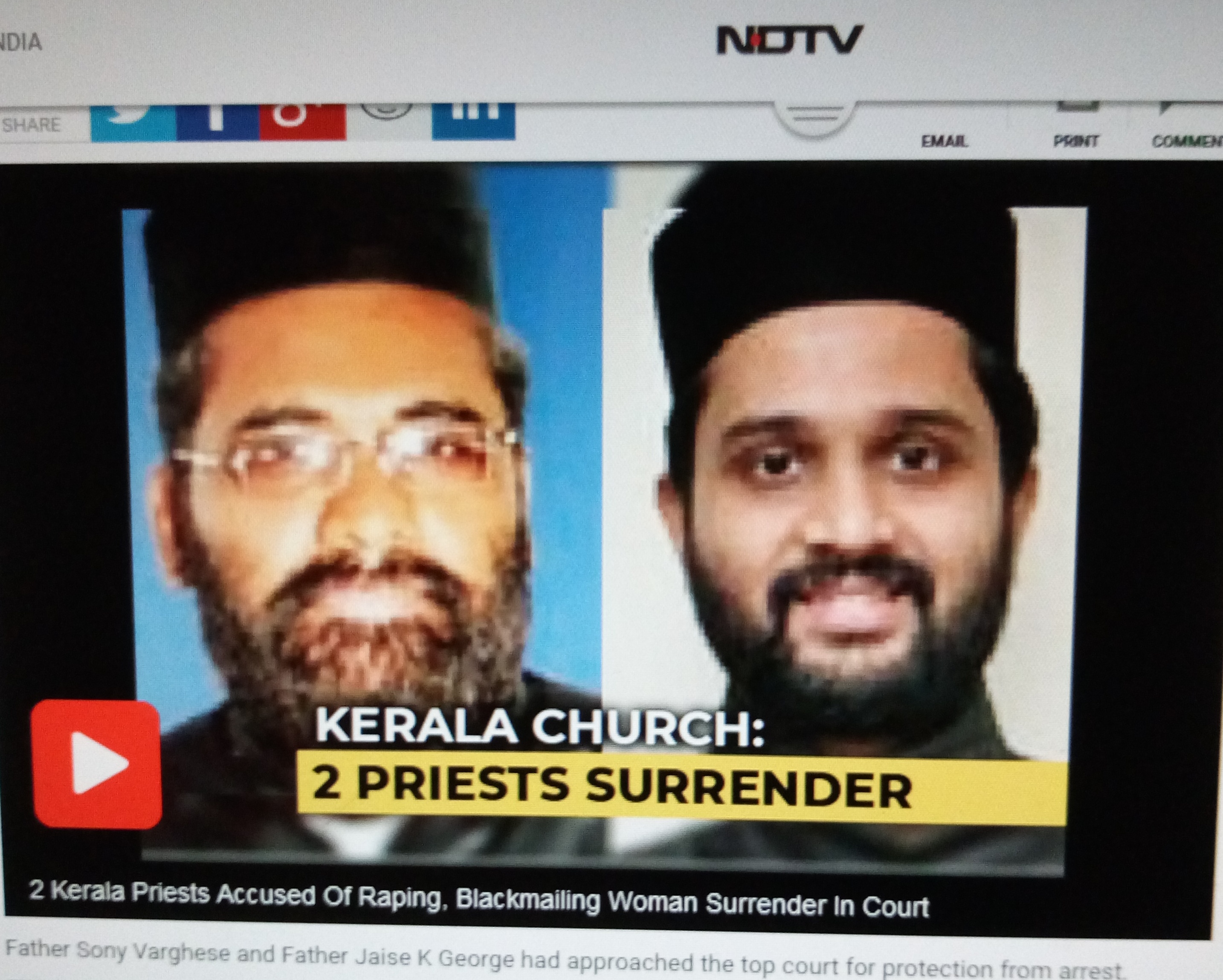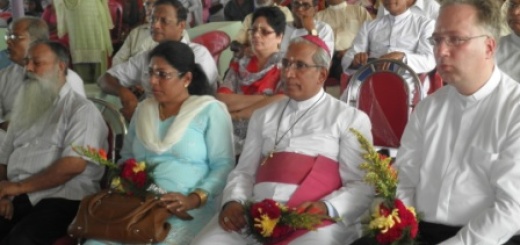PRIESTS, PREACHERS AND POLLUTION

Cover image: Father Sony Varghese (Abraham Varghese) and Father Jaise K George, accused of raping and blackmailing a woman for several years, surrendered before a local court today. (Courtesy: NDTV News Thiruvananthapuram 13th August 2018)
 This is a sequel to Joseph Mani's earlier article The Confession Conundrum. In the wake of the confession-related scandal in Kerala, the NCW chairperson has suggested that Confession should be banned. The Churches have vehemently opposed the suggestion whereas the BJP government, through its Minister Alfons Kannanthanam, has distanced itself from the NCW recommendation. He wrote if still people want to go to Confession, it is their freedom and what is needed is not a ban but education.
This is a sequel to Joseph Mani's earlier article The Confession Conundrum. In the wake of the confession-related scandal in Kerala, the NCW chairperson has suggested that Confession should be banned. The Churches have vehemently opposed the suggestion whereas the BJP government, through its Minister Alfons Kannanthanam, has distanced itself from the NCW recommendation. He wrote if still people want to go to Confession, it is their freedom and what is needed is not a ban but education.
In this article besides explaining the confession conundrum he writes the Church realized early in its history that if the laity were to respect and obey the priests and bishops based on what they do, its control over the laity would go for a toss because many priests and bishops (and cardinals and Popes) even in those days were not paragons of virtue. So the Church brought in the concept of position power. A priest or a bishop or a Pope has to be obeyed and respected because he is a priest or a bishop or a Pope, however bad he is – respect the chair. Let the readers ponder over the thought- provoking article. Isaac Gomes, Asso. Editor, Church Citizens' Voice.

* Joseph Mani
There is a lot of discussion in the media and in many homes about the alleged rape of a nun by a bishop and of a married lady by four priests.
I have tried to put myself in the shoes of these holy men and see if there is reason for all this fuss.
Rape, sex without the rational consent of the other person, is abominable, unacceptable and unambiguously condemnable.
Having said that, let us look at the case of the four priests. It was reported that one of the priests told the police that even if he had had sex with the lady, which he denied, it was consensual and, therefore, no crime. Let us for the moment accept that the priest is telling the truth – that it was consensual sex. What is wrong in that? I for one believe that sex between rational consenting adults is perfectly acceptable as long as it does not hurt anyone. Suppose we heard a story that a layman had sex with a lady with her full consent, we would probably shrug it off saying “So what? No big deal.” (I am not getting into the question of adultery here, I am talking about consensual sex per se)
Our shock and angst arise from the fact that these were not laymen, they were priests and we think priests should not behave in this scandalous way. But our reaction may be because there is a disconnect between the role of priests as we see it and the way the priests themselves see their role as illustrated by the following story (I was told that this incident actually happened, but since I cannot vouch for its veracity let us keep it as a story).
There was a parish priest, Fr. Joseph. He was known to be the worst womanizer in town; it was known so widely that no parent or husband would let their young daughters or wives go to the priest’s office unaccompanied. He also possessed enormous wealth. He owned a gun which he claimed was to protect the church from robbers, but people believed that it was to protect his estates.
One day there was a wedding in the church. From the pulpit Fr. Joseph spoke earnestly about the virtues of chastity and purity. He reminded his flock the biblical words that if a man even looked at a woman with lust he has already committed adultery with her. Turning to the groom he told him that he should not look at even his wife with lust, that God intended physical relations between a man and a woman only to increase the population of the saved and not for pleasure. Fr. Joseph then warned the newlyweds against the sin of greed and the evils riches can bring. He told them the story of Jesus telling the rich young man to sell all his possessions and give to the poor if he wanted to follow him. The priest followed it up with Jesus’ comparison of a rich man going to heaven with a camel going through the eye of a needle. He extolled the virtues of poverty and maintained that poverty and suffering bring us closer to God. The priest exhorted the young couple not to hanker after material possessions and earthly pleasures but devote their lives to the service of the Lord in chastity, humility and poverty.
Thomas who was a classmate of Joseph was in the congregation. Thomas was disgusted. After the service he confronted the priest in his office and said “You hypocrite! The whole world knows what a debauch you are and how much wealth you have amassed. Aren’t you ashamed to preach about chastity and poverty to others?”
Fr. Joseph calmly replied “Sit down, my friend. Let me explain something to you.”
Thomas sat.
The priest asked “While coming to the church did you notice a road sign with an arrow saying ‘KOTTAYAM’?”
Thomas said “Sure, but what has that got to do with what I was saying?”
Fr. Joseph said “Hold on, I will come to that. Tell me what that sign means.”
“Obviously it means if I follow that sign and travel along that road I’ll reach Kottayam.” Thomas replied. “But ….”
Fr. Joseph interrupted him “So that sign tells you how to go to Kottayam”. Then he asked Thomas “Have you ever seen that sign itself going to Kottayam?”
“Of course not”, Thomas said. “The sign shows us the way to Kottayam, it itself doesn’t go to Kottayam.”
The priest said “That is the point I wanted you to understand.”
This story illustrates where our problem is. We lay people think that the role of our priests and bishops is not only to point to us the way to heaven by their preaching but they must also show us how to reach heaven by their actions, while the priests and bishops think their duty is only to tell us how to go to heaven, but whether they themselves go to heaven is none of our business. They are role models in what they preach, but they do not think they have to be role models in what they practice. They can support their stance by quoting the bible itself. Did not Jesus tell his disciples to do what the Pharisees say because what they say is good but not do what the Pharisees do because what they do is evil? If that was the right way to judge the Pharisees of Jesus’ time, should we not judge the modern-day Pharisees in the same way – by what they preach and not by what they do? Priests and bishops think it is enough for them to advise us to be chaste, frugal and humble, but they themselves need not be any of these. That is why we do not see many priests and bishops who are frugal or humble. They think it is enough that they remind the laity that Jesus came to serve, not to be served, but they themselves have to be served. We see this when priests visit our homes or officiate at a church function or when a bishop makes his rare appearance. It is their divine right to be served and receive obeisance from their subjects. They will tell us that Jesus sat with publicans and tax collectors and shared meals with them, but the priest or bishop at a wedding reception has to be served separately away from the sinful crowd. They will tell us that the most important trip we can make in life is to meet the other person half-way, but have you ever seen a priest or a bishop meeting an ordinary person half-way, literally or figuratively?
The Church realized early in its history that if the laity were to respect and obey the priests and bishops based on what they do, the Church’s control over the laity would go for a toss because many priests and bishops (and cardinals and Popes) even in those days were not paragons of virtue. So the Church brought in the concept of position power. A priest or a bishop or a Pope has to be obeyed and respected because he is a priest or a bishop or a Pope, however bad he is – respect the chair. This became so ingrained in the minds of catholics that when Michelangelo complained about how bad some of the Popes he had to deal with were, his mother advised him to respect and obey the Pope because he was the representative of Christ. Because of this centuries of conditioning, we the laity accord them respect and obsequence which many of them do not deserve as persons.
So the problem is that our perception of a priest’s or bishop’s role is quite different from their own perception of their role. We think they must preach and practice the right things, they think their mandate is only to preach, practice is for the laity. They say “We preach, you practice”, a neat division of labour.
The other reason we are anguished and angry over the behavior of the four priests is that they are said to have misused the information received in the confessional when confessional secret is supposed to be sacrosanct. It makes us question the very idea of Confession itself. We may even think of avoiding the confessional in future.
Please don’t. Let us examine why the Church puts so much emphasis on Confession.
Again let us look at it from the point of view of the clergy. For the clergy sin and Confession are important tools of control. Think about this: On the one hand the Church tells me that from my birth itself I was tainted by a sin so grave that God Himself had to come down from the heavens, live among sinful humans, suffer ignominy and torture, shed his blood and die on a cross so that I could obtain forgiveness for this grave sin, though it was a sin I did not commit and nobody is able to tell me what that sin was, who committed it, when it was committed and why I am held liable for this mythical sin; on the other hand the same Church tells me that even if I commit the most heinous crimes like rape or murder, I can obtain forgiveness by simply confessing to a priest and reciting five Hail Marys or making a donation to the church. This is patently an absurd thesis. But if Confession is such an irrational idea, why do the Church and its priests make it an essential part of the salvation kit?
The Church and the priests need Confession even if the laity don’t.
Let us try to understand why. The Church hierarchy needs the laity for its survival just as a political party needs voters for its survival. This laity has to be under the power and control of the Church authorities. So the Church has volumes of Cannon Laws as instruments of control. These Laws are mostly outdated, often contradictory and are confusing even to the Cannon Law experts, let alone to the lay person as the Church authorities themselves have admitted. But this makes these Laws an even more effective tool to control the laity since nobody is clear what the Law says. One honest priest told me: These days many lay persons are quite knowledgeable about scripture, theology and Church history and they can intelligently question us on these, but Cannon Law is a black box to most of them. So we priests use the Cannon Law to brow beat the laity.
Confession is another instrument of control. The Church knows that it can control people, even if indirectly, through Confession by linking it to sin. After the confession-scandal broke, the head of the Syro Malankara Orthodox Church promptly sent out a pastoral letter exhorting the faithful not to be deterred by the scandal but to continue to flock to the confessional as they have been doing all along. The Church needs Confession.
Once a parish priest told me that there was a disturbing trend that while a large number of the faithful were coming for Communion, very few were coming for Confession. I said that if only a few people were coming for Confession it meant that most of his parishioners were not committing any sin and it must be a matter of joy for the priest. But he insisted that it was a matter of grave concern for him because Confession was essential. Later there was a message in the parish WhatsApp Group saying that confessing frequently was a very effective aid to salvation. I pointed out that to confess frequently I must sin frequently. The parish priest and some parishioners pounced on me denouncing my statement as heretical. Later I realized that they were right. The Church needs Confession because Confession is linked to sin and the Church needs sin. The whole Christian religion is based on the sinfulness of humanity. If there was a utopian world where no one committed sin, the priests and bishops will re-invent sin and Confession to keep themselves gainfully employed. They need people to be in sin for their own survival. It could even be argued that those priests, bishops and cardinals who commit rape and indulge in financial and other forms of corruption are urging us to commit some sins, at least occasionally, because if sin disappears altogether, our Holy Church will also disappear. A sin-free world will obviate the need for Churches and priests. Fortunately there is no danger of that happening; the Churches have been making sure that from a young age the innocents are constantly and continuously told about their sinfulness and the need for frequent Confession. For the clergy sin is oxygen.
There is the story of a Christian who was a great sinner. Then he went to Potta, attended a charismatic retreat and was reformed. At the end of the retreat he prayed to God “Lord, I’ve been a sinner all my life. Praise the Lord. Now I have decided to give up sin and reject Satan and all his works. Praise the Lord. My prayer to you, Lord, is to give me the grace so that I may never sin again. Praise the Lord. Lord, hear my prayer. Praise the Lord.” God answered “Will you stop wasting my time with your ‘Praise the Lords’? I have no need of your praise or thanks because I am Self-Contained. I don’t become happy when you praise me and sad when you don’t because I am Immutable and Unchanging; my mood doesn’t change with your ramblings. Besides, I have taught you that you should not look for praise or gratitude from others when you do good to them, then why do you think I expect to be praised or thanked? Now coming to your request for grace to never sin, sorry, that is one prayer I cannot grant. If I grant you your wish, by the principle of equity, I’ll have to grant the same to all those who ask for it. But if everyone stopped sinning there will be nobody for my Church and my priests to dispense forgiveness. Then where will my Church and priests be?”
We have a religion and a Church whose survival and prosperity are threatened if people stop committing sin!
So when our priests and bishops harp on sin and Confession, they are not doing it purely for their own selfish interest; they are doing it for Holy Mother Church. The raison d’etre of priests and Churches is sin. As I mentioned earlier, a world without sin will be a world without Christian Churches. A political party whose vote bank is the poor has to perpetuate poverty and will resist any attempt to eliminate poverty though it will publicly say the opposite; a Church whose bedrock is sinners has to perpetuate sin or the illusion of sin, though its public posture will be that its mission is to fight sin. Unless people commit sin or at least are made to think they are committing sin, many of the clergy will have to look for alternate employment, go on welfare or will have to be declared a protected species in danger of extinction. So while we may think Confession is meaningless, the priests and bishops know that sin and Confession are necessary for the Church to survive which in turn is necessary for them to survive and prosper.
These men have dedicated their lives for our service, they deserve our help. My appeal, therefore, to all men of good will, is to help our priests and bishops by committing sin and by going to Confession, and do it frequently. Luckily for us and the Church there are so many perfectly legitimate things we can do which will qualify as sins in the eyes of the Church, for example, questioning some infallible papal pronouncements, exposing ecclesiastical corruption, suggesting that a lot of the bible is myth borrowed and adapted from earlier myths, being gay or watching porn.
Some priests may misuse the confessional, but we must look at the greater good which is to keep our Reverend Fathers and our Rt. Reverend Lordships and Eminences in good health and cheer. We must remember that these Reverends and Eminences are representatives of a person whose parents, they tell us, could not even get a room in a village inn and he had to be born in a manger; we must remember that these great men in their splendid Santa Claus-like robes and glittering jewelry are self-attested successors of some simple fishermen who depended on the vagaries of the weather and the mood of the fish for their livelihood. They cannot properly discharge their duties as representatives and successors of the simple Galilean and the illiterate fisher folk without gourmet cuisine, palatial residences and customized BMWs. We must not grudge them these; they want all these little comforts and conveniences not for themselves, but only to serve us better.
So let us continue to sin or at least go to Confession often which will reassure the clergy that we are sinning and their jobs are secure.
But there are dangers looming for the clergy. Some in the laity are becoming aware of the control function of Confession and the threat it poses. They know that the confessor holds a Damocles sword which he can drop on their heads any time as seems to have happened to the hapless married lady caught in the web of the four reverends. So the laity have become clever. For example, during the Holy Week confession mela in our parish, there is one priest who has the largest number of sinners queuing up. This priest knows nobody in our parish because he stays in an old age home for retired priests far away from our parish. There is the added advantage that he is about 90-years old and said to be practically deaf. The faithful can hope that their sins will fall on deaf ears, literally. No wonder parishioners flock to him for confession rather than to the parish priest or his assistant who knows each person by name and face.
Let us now look at our preachers. In my church-going days I would be forced to listen to the Sunday sermons. Nowadays I often watch evangelical TV channels like Shalom TV, Goodness TV and Harvest TV. Listening to the preachers in the church or in retreats and conventions on TV used to make me angry. These preachers appeared to be either ignorant (ignorant even of the bible) or liars because they were often dishing out falsehoods and half-truths supported by selective bible quotes. But now I am not all that angry. I realized that this preacher with his impressive oratory, another with his miracle claims (Goodness TV), a third with his histrionics (Harvest TV) and others are neither ignorant nor liars. They are knowledgeable, honest people doing a job for which presumably they receive handsome remuneration in cash or kind. As conscientious workers, they try to do an honest day’s work for an honest day’s wages. Once again, the problem was that there was a mismatch between my idea and their idea of what their job should be. The mistake I was making was to think that a preacher’s job was to help the members of his congregation to use their brain, to sit up and think, to reason, to question and to search for the truth. But it turns out that their idea of their job was to deliver a message to the congregation. Their message to the audience is that all of you are sinners, every one of you; you are born in sin, you live in sin and you will die in sin and are destined to be hurled into an eternal torture chamber unless you follow the right Book, the right Church, the right dogmas and the right rituals, and the right ones are my Book, my Church, my dogmas and my rituals. Sometime ago I listened to an interview a preacher gave on Goodness TV. He talked about the appearance of the Blessed Virgin at some obscure place in France (not Lourdes). Then he stated that during the eight years following these apparitions, eight million people in France converted themselves to Catholicism. He did not clarify whether it was exactly at the rate of one million per year. The pertinent point is that he was clear that it was conversion to Catholicism. It would have been of no significance if eight million people became better human beings or more charitable or got converted to other Christian Churches or to other religions. The Blessed Mother was only on a membership drive for the Catholic Church. (Mr. Amit Shah could get a few pointers from her). Left to the preachers on Harvest TV, perhaps there would have been no Mary appearing, and if at all any conversion took place it would have been to a Church other than the Catholic Church.
So if these priests and preachers believe, as they seem to do, that their job is to convince their congregation about the utter sinfulness of the human race, then they are doing a great job. If they employ a few falsehoods, half-truths or deceptively selected bible quotations, that should be acceptable because these are employed as means to an end and the end is a noble one. The preacher can also be reasonably certain that nobody from the audience is going to question his assertions. The vast majority of those who regularly attend Sunday services, or flock to retreats and conventions are the already-converted, amen crowd. Even if there is an odd individual who doubts the validity of some of the pronouncements of the man of God, he or she will not risk voicing their doubts. He is aware that he is in the midst of a hysterical mob shouting “Amen, Amen, Praise the Lord, Praise the Lord.” This mob will instantly lynch the doubting Thomas while fervently chanting “Thank you Jesus for delivering this apostate into our hands. Thank you Jesus, Thank you Jesus.”
So again the problem was a difference in perception between what I thought the preachers should be doing and what they thought they should do.
Let me end with a story the late Rev. Billy Graham told about himself.
When he was starting out as an evangelist, he was to preach in a small town. There he wanted to post a letter. He asked a 12-year old boy the way to the post office. The boy gave him directions. Then Billy Graham told the boy that he should come to the Town Hall that evening and listen to him preach. The boy asked him for what.
Billy Graham said “I can show you how to go to heaven.”
The boy shook his head and said “I don’t think I will come.”
Billy Graham asked him why.
The boy replied “How are you going tell me how to go to heaven when you don’t even know how to go to the post office?”
May be we should follow the example of this wise boy. May be we should not depend on our priests and preachers to take us to heaven, if heaven exists. May be we should take that responsibility on ourselves and realize that God, if He exists, has given each of us adults the ability to find our own salvation, whatever our definition of salvation is.
In any case, our priests and preachers have mostly failed us and many of them are only adding to the pollution of the moral environment.
I shall appreciate your comments.
* The writer who is author of the book BEYOND GODS & SCRIPTURES can be contacted at manijoseph3@gmail.com
As per NDTV News Thiruvananthapuram dated 13 Augut 2018: Two of the four Kerala priests, accused of raping and blackmailing a woman for several years, surrendered before a local court today.
The priests from the Malankara Orthodox Syrian Church, Father Sony Varghese (Abraham Varghese) and Father Jaise K George, had approached the Supreme Court for protection from arrest after the Kerala High Court rejected their plea. They were told by the top court to first surrender before the local court by August 13.
Father Abraham surrendered before a court in Thiruvalla town today and the other priest, Father George surrendered before the police in Kollam district.
The two other priests – Father Job Mathew and Father Johnson V Mathew – who were arrested last month are out on bail.
Last month, the National Commission of Women (NCW) recommended abolishing the practice of "confessions" in churches as they felt it can lead to blackmailing of women. The suggestion came after a number of women alleged rape and sexual abuse by priests and church officials.
.
















